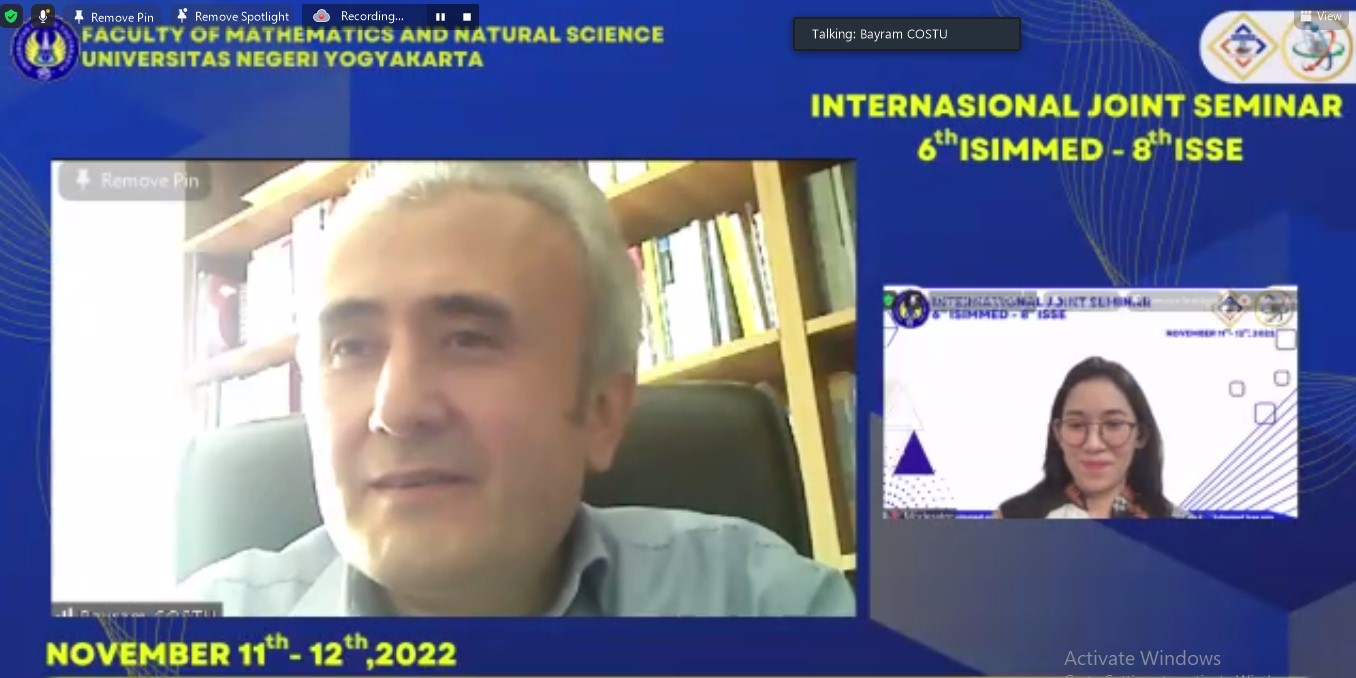 Bahasa Indonesia
Bahasa Indonesia English
English
You are here
ISIMMED-ISSE 2022
Primary tabs

In 2022, Faculty of Mathematics and Natural Sciences, UNY will again hold The 8th International Seminar on Science Education (8th ISSE) by online. The activities initiated by four study programs (Physics Education, Chemistry Education, Biology Education, and Science Education) are an annual agenda to provide opportunities for lecturers and students to share research results and provide experience in scientific forums. This activity will be held online from 11 to 12 November 2022 with the theme "New Thought, Research, and Practice of Mathematics and Science Education in the Post-Pandemic Era". This year, the ISIMMED-ISSE activity was attended by 150 participants from various universities in Indonesia, with the main speaker Dr Jose Hanham from Secondary Education Western Sydney University, Ian Jones, P,hD., from Reader in the Mathematics Education Center Loughborough University, Prof. Dr Maija Katariina Aksela, P.hD. from the Department of Chemistry, Faculty of Science, University of Helsinki, Prof. Dr. Bayram Costu, from Yildiz Techincal University, Turkey, Dr. Hartono from UNY, and Dr. Slamet Suyanto from UNY.
Bayram Costu, in his presentation entitled Flipped Learning in Science Education: What is the Effect on Students' Achievement? said Flipped learning is a blended learning model that involves technology to influence classroom learning. Thus, a teacher can have more time to interact with students than teach; therefore, there is an opportunity to provide students with more personal feedback and assistance and receive feedback from their peers about the activities they are doing and what is not yet understood. "Flipped Learning education has four pillars, namely a flexible environment, a learning culture, intentional content, and professional educators," he explained.
Our research investigates the impact of implementing the Flipped learning model on academic achievement in science classes. As a result of this research, meta-analysis shows that applying the flipped learning model in science lessons has a moderate influence on student academic achievement compared to science lessons taught using traditional teaching techniques. In connection with these findings, it can be concluded that the Flipped learning approach benefits students' science achievement. Meanwhile, Slamet Suyanto explained that science education developed dramatically from pedagogy and andragogy to heutagogy, pedagogy and cybergogy. "Science education after the COVID-19 pandemic uses the principles of heutagogy, peeragogy and cybergogy. Online learning is developed in various ways to meet students' needs and interests. Now, we have blended learning, flipped classroom, station rotation, and laboratory station rotation. Blended learning is a combination of online learning and offline learning. One week, students study online, and the next week, students study offline. The flipped classroom is an example of blended learning. Students can read books or search for information online at home or outside the classroom during online learning. "The following week, students attend class, share knowledge with friends, and study higher-order thinking skills," he said.
Slamet Suyanto added that another hybrid learning mode is station rotation learning. Students can study online from the internet to get relevant information. In teacher-led instruction, the students then learn offline synchronously with the teacher and their peers. The students then study with their groups in a peeragogy manner to share knowledge and collaborate.

Kontak Kami
Program Studi Pendidikan Fisika
FMIPA Universitas Negeri Yogyakarta
Kampus Karangmalang Yogyakarta 55281
Telepon dan fax (0274) 550847
Email: pend_fisika@uny.ac.id
Copyright © 2026,
